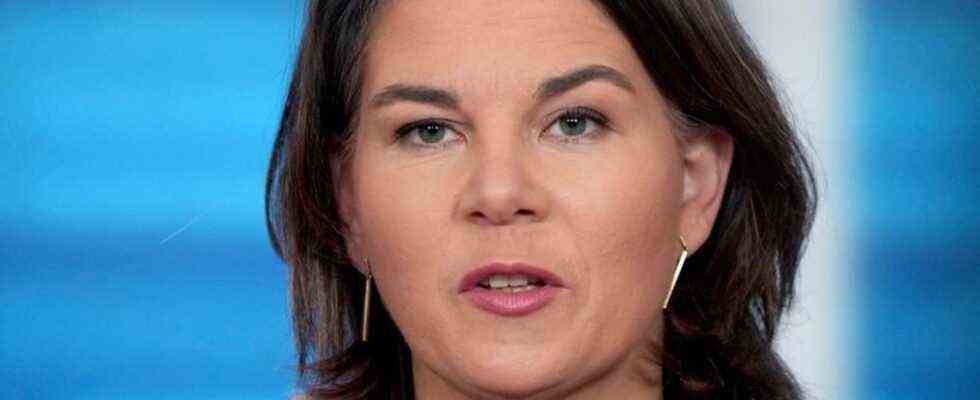Foreign policy
Baerbock: Return from Russia to the G7 is not in sight
Federal Foreign Minister Annalena Baerbock (Greens). Photo: Michael Sohn / Pool AP / dpa
© dpa-infocom GmbH
Climate protection and fighting pandemics: these will be topics of the German G7 presidency in 2022. At the summit in the Bavarian Alps, however, one country will certainly not be there.
A return of Russia to the G7 of the leading Western economic powers is currently not in sight for Foreign Minister Annalena Baerbock.
“It is of course very painful that Russia has excluded itself from this circle by annexing Crimea,” said the Green politician of the German Press Agency, referring to Moscow’s actions on the Ukrainian Black Sea peninsula in 2014. “Currently it is not foreseeable when Russia will be able to return to the round – the current escalation does not make the situation any easier. ” What is meant is the deployment of Russian troops near the Ukrainian border.
In addition to Germany, the “Group of Seven” also includes Great Britain, France, the USA, Italy, Japan and Canada. On January 1st, Germany will take over the presidency from Great Britain for one year. The highlight will be the summit meeting at Schloss Elmau in the Bavarian Alps from June 26th to 28th. US President Joe Biden’s first visit to Germany since taking office a year ago could also be connected with him. The German G7 Presidency will focus on climate protection, fighting pandemics and strengthening the world’s democracies.
Trump wanted Russia’s return to the G7
The group of western industrial nations was founded in 1975 by the then Federal Chancellor Helmut Schmidt and the French President Valéry Giscard d’Estaing during a global economic crisis, initially as the “Group of Six”, which one year later became the G7 with Canada. Russia was admitted in 1998, but excluded again in 2014 due to the seizure of the Ukrainian Crimea.
Four years later, then-US President Donald Trump made a surprise move for Russia to return to the group, but failed at the 2019 summit in Biarritz, France. Russia itself is no longer interested in the format and is relying on the larger G20, which also includes China, India and Brazil.
G7 as a group of democracies in system competition
The G7 is now trying to distinguish itself as a group of states that defends Western values in system competition with countries like China and Russia. Great Britain therefore invited countries such as India, South Korea, South Africa and Australia to the summit this year. Baerbock said that she wanted to have countries with her at the two planned foreign ministers’ meetings, “which stand for economic development along with common values such as freedom and the rule of law.” There are considerations to invite African states to the one meeting and to the other countries from the Pacific region.
A major focus of the German G7 presidency will be climate policy. It shows “in a dramatic way that the escalation of the climate crisis not only brings terrible suffering for individual people in different regions” – in Germany for example during the flood disaster this year, said Baerbock. “The climate crisis also exacerbates conflict in different regions of the world. Every tenth of a degree less global warming is a contribution to international security. ” Baerbock had brought responsibility for international climate policy from the Ministry of the Environment to the Foreign Office.
Chancellor Scholz not only had positive summit experiences
“Act before it’s too late” is one of the main messages of the G7 year, according to Baerbock. It should also be about the corona pandemic and the resilience of democracies. The exact program will be presented at a later date, but the location of the summit was announced shortly after the new government took office. As in 2015, it will be Schloss Elmau near Garmisch-Partenkirchen.
Chancellor Scholz will then host such an important international meeting for the first time. As finance minister, however, he has already been at several G20 summits. In addition, at the G20 meeting in Hamburg in 2017, he was the first mayor of the Hanseatic city to be responsible for preparing the summit. The meeting was overshadowed by massive riots with considerable damage in downtown Hamburg.
The G7 summits have not been held in large cities for 20 years. For the penultimate summit – at that time still G8 – the federal government had chosen the Ostseebad Heiligendamm and then Elmau. At the announcement of the summit location, government spokesman Steffen Hebestreit praised the “scenic backdrop”, which provided an attractive setting for the talks as early as 2015, left a lasting impression worldwide and ensured that everything ran smoothly.

